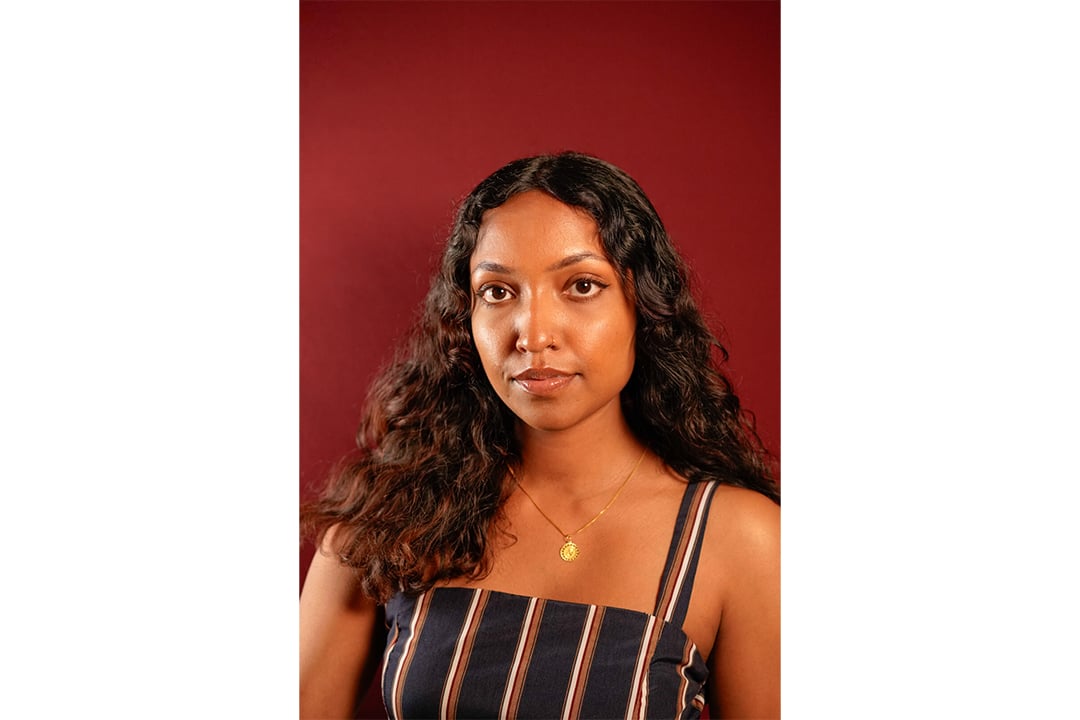Myuri Srikugan is at home in Scarborough. As a child, she would run around with her dad’s Nokia phone, taking photos of her wall, of anything. Her uncle brought over a camcorder, and she ran around again, taking videos. Photos of her extended family lay all around her home. They chronicle where her family, the backbone of her community, has been and who they are.
Years later, Srikugan graduated from UTSC with a minor in Studio Art alongside her Human Biology major. She is a Tamil-Canadian digital artist based out of Scarborough, living in the same home where she started taking photos and videos. Srikugan is never far from her roots, which are reflected in her work that often centres on her family and Scarborough community. “I’ve been living here my whole life, like this exact spot… And I feel very close to it,” she said in an interview with The Varsity.
Srikugan’s work is currently on display until July 31 in UTSC’s Instructional Centre Vitrines as part of the Doris McCarthy Gallery’s exhibition The Yet. The exhibition envisions the future and how the past informs it. The Yet exhibit was developed in conjunction with artist Erika DeFreitas, who mentored Srikugan and two other emerging Scarborough artists. Srikugan described working with DeFreitas, one of her inspirations, as being “so surreal.”
In the exhibition, Srikugan showcases three photos called “Love Letters to the Wombs Before Me.” It consists of one photo of her mother, one of her and her sister, and one of her grandmother’s family. She then crafted a love letter to accompany each photo to show her gratitude to the people portrayed in them and the complexity inherent in familial relationships.
The photos allow her to peer into her family’s lives and solidify a connection with them that she might not always be able to create in person. Since her grandmother lives in Sri Lanka, the time they spend together is infrequent and only happens once every few years. As a result of this distance, Srikugan acknowledges that she doesn’t have “the closest relationship with her.” Regardless, Srikugan described her grandmother as “someone that [she] just [admires], and [she’s] always mesmerized by when [she sees] her.”
As a photographer and documentarian, Srikugan recognizes the complexity and rich emotional lives behind the subjects she profiles. Her work explores that sentiment and she strives to create intuitively and address overlooked or potentially taboo topics head-on to find healing for all parties involved.
One of these unstated topics is Scarborough’s negative reputation. Travelling around the GTA, she has noticed others’ negative perceptions of Scarborough. At one point, it made her question her hometown and even avoid putting Scarborough on her resume. “I’m just like, is this a bad place?” she’d ask herself. But she shakes that off through her art, which often highlights Scarborough residents and includes collaborations with local organizations.
Her past work also includes a documentary profiling Abhirami, a trans, non-binary Tamil person, and their experience with colourism. The documentary is straightforward and delves immediately into Abhirami’s internalized childhood belief that having darker skin means being undesirable. Overlayed with Abhirami’s honest commentary, the documentary has footage of them existing naturally in scenery outdoors — beyond their skin colour, they are a person to be seen and heard up close.
Experiencing and combatting colourism is a personal journey with deep-seated generational roots. Srikugan found that she could capture familiar experiences in the Tamil community and be open about her heritage through the lens of another.
For Srikugan, art is rooted in the people you get inspiration from, collaborate with, and showcase to. When Srikugan interacts with other creatives — such as the Supercollective, an informal group of Scarborough artists she belongs to who meet up regularly to support each other — she feels energized and a sense of gratitude. The people around her are the foundation of her work.
When capturing other people through photography or documentary, she’s honing in on qualities already in them instead of moulding them into something that they are not. Her advice for potential photoshoot subjects: “If you want to be seen as confident, then you need to come as confident.”
After a work has been completed, Srikugan believes that the art “should be brought out to the communities and made more accessible to the working class as well.” For example, she turned her documentary with Abhirami into stills and displayed them at a local bakery exhibit held by the Tamil Archive Project and Scarborough Arts. Part of Srikugan’s responsibility as an artist is to bring her work to people.
As for her current work, she is finishing up a documentary titled “Imminent Visions,” and she’s gathering inspiration for future projects. After a long stretch of creation and working with DeFreitas, she is now soaking in other people’s art.
Srikugan’s art career is just beginning, but it will always be grounded in her Tamil-Canadian heritage and sense of place. “I’m always going to return to Scarborough at some point. It’s always so sweet. Just the way specifically creatives talk about this space, too, and how they find home here,” she said.
The people are where this artist finds inspiration — and for her, the people are in Scarborough.Interested readers can find Srikugan’s work on her website.
Editor’s note (February 22): This article has been updated to include the Tamil Archive Project and Scarborough Arts’ contributions to Abhrami’s exhibit.



No comments to display.